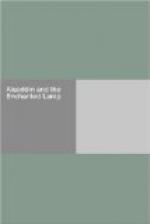[FN#64] The slave’s attitude before his master.
[FN#65] The like.
[FN#66] Night DII.
[FN#67] i.e. invoked blessings upon him in the manner familiar to readers of the Nights.
[FN#68] Lit. thou [art] indulged therein (ent musamih fiha).
[FN#69] Mehmy (vulg. for mehma, whatsoever) telebtaha minni min en miam. Burton, “whatso of importance thou wouldst have of me.”
[FN#70] Lit. “in a seeking (request) ever or at all” (fi tilbeti abdan). Burton, “in thy requiring it.”
[FN#71] Tal aleyya " wect, i.e. I am weary of waiting. Burton, “My tarrying with thee hath been long.”
[FN#72] Or “difficult” (aziz); Burton, “singular-fare.”
[FN#73] Lit. “If the achievement thereof (or attainment thereunto) will be possible unto thee [by or by dint of] fortitude,”
[FN#74] Lit. “Wealth [is] in (or by) blood.”
[FN#75] El berr el atfer. Burton translates, “the wildest of wolds,” apparently supposing atfer to be a mistranscription for aefer, which is very possible.
[FN#76] Kewaribji, a word formed by adding the Turkish affix ji to the Arabic kewarib, plural of carib, a small boat. The common form of the word is caribji. Burton reads it, “Kewariji, one who uses the paddle.”
[FN#77] Lit “inverted " (mecloubeh). Burton, “the reverse of man’s.”
[FN#78] Night DIII.
[FN#79] Wehsh. Burton, “a lion.”
[FN#80] Lit. “then they passed on till” (thumma fatou ila [an]).
[FN#81] Sic (ashjar anber); though what the Arabic author meant by “trees of ambergris” is more than I can say. The word anber (pro. pounced amber) signifies also “saffron”; but the obbligato juxtaposition of aloes and sandal-wood tends to show that what is meant is the well- known product of the sperm-whale. It is possible that the mention of this latter may be an interpolation by some ignorant copyist, who, seeing two only of the three favourite Oriental scents named, took upon himself to complete the odoriferous trinity, so dear to Arab writers, by the addition of ambergris.
[FN#82] Yas, Persian form of yasm, yasmin or yasimin. Sir R. F. Burton reads yamin and supposes it to be a copyist’s error for yasmin, but this is a mistake; the word in the text is clearly yas, though the final s, being somewhat carelessly written in the Arabic Ms, might easily be mistaken for mn with an undotted noun.
[FN#83] Lit. “perfect or complete (kamil) of fruits and flowers.”
[FN#84] Lit. “many armies” (asakir, pl. of asker, an army), but asker is constantly used in post-classical Arabic (and notably in the Nights) for “a single soldier,” and still more generally the plural (asakir), as here, for “soldiers.”
[FN#85] Syn. “the gleaming of a brasier” (berc kanoun). Kanoun is the Syrian name of two winter months, December (Kanoun el awwal or first) and January (Kanoun eth thani or second).




